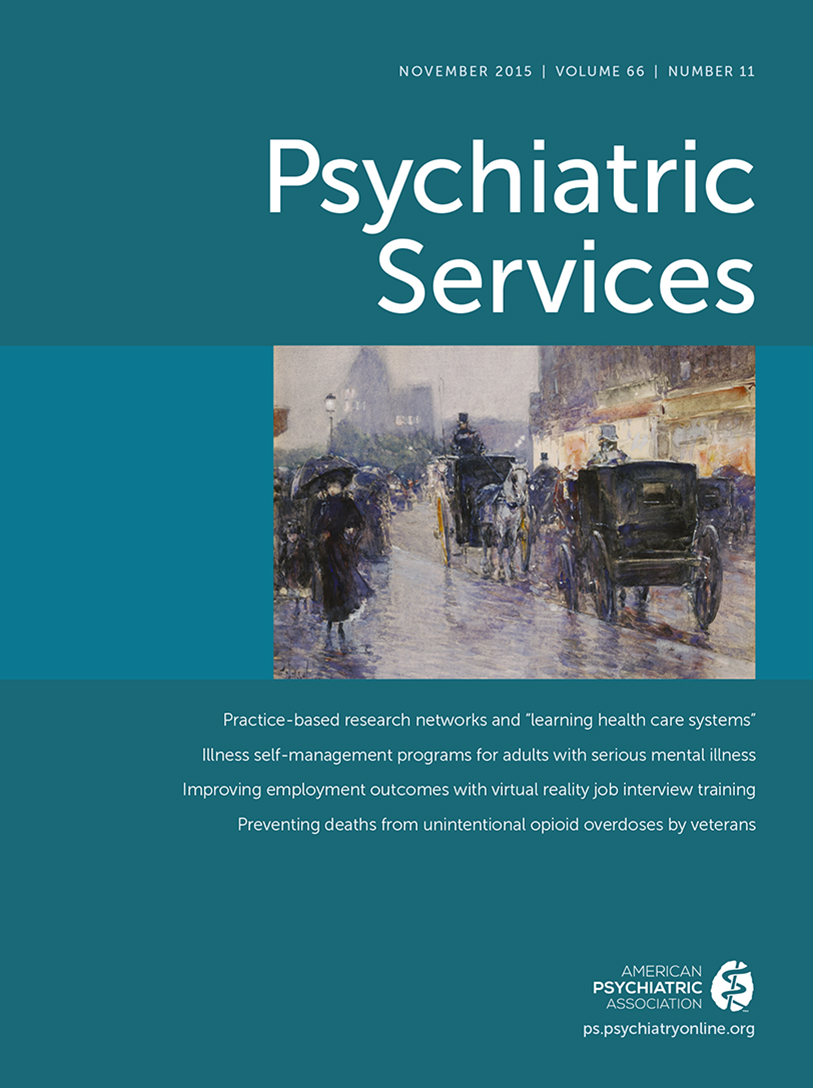MHA’s annual ranking of states: This year’s report by Mental Health America (MHA) on mental health issues and access to care across the nation documents a wide gap in access to needed treatment, especially among children and adolescents. Between 2010 and 2013, rates of depression rose among youths ages 12 to 17—an increase of 1.2% in youths with depression and 1.3% in those with severe depression. But nearly two-thirds of youths with depression received no outpatient services, according to the report, and only one in five with severe depression received consistent outpatient care (at least seven visits a year). Overall, 57% of adults with mental illness received no treatment. Even in the highest-ranking states, only about half of adults with mental illness received care. In the MHA ranking, Minnesota is at the top of the list, with the lowest prevalence of mental illness and the highest access rates. Massachusetts and Connecticut are ranked second and third. Even though access to care was assessed as fair in Oregon, the state is ranked 51st, largely because of high prevalence rates of mental and substance use disorders. Arizona and Nevada join Oregon at the bottom of the list. Nationally, there is only one mental health provider for every 566 individuals, according to data cited in the report. In states with the greatest number of mental health providers—Massachusetts, Maine, and Vermont—there are approximately 250 individuals for every mental health provider. In states with the lowest number—West Virginia, Texas, and Alabama—there are about 1,100 individuals for every provider. This year’s “Issue Spotlight” focuses on prevention and early intervention and describes programs and policies that address risk factors and increase protective factors. The report is available on the MHA Web site (
www.mentalhealthamerica.net).
IOM publication highlights opportunities to improve child behavioral health: Provisions in the Affordable Care Act (ACA) could greatly improve the behavioral health of children and adolescents. For example, the ACA legislated the standards of pediatric well-child and preventive coverage recommended by the American Academy of Pediatrics and established a grant program to provide voluntary, evidence-based home-visiting services to young at-risk children and their families. Earlier this year, the Forum on Promoting Children’s Cognitive, Affective, and Behavioral Health held a workshop to explore how health care reform can support and sustain innovations to improve children’s behavioral health. Discussions and recommendations from the workshop are summarized in a new report from the Institute of Medicine (IOM). Experts at the workshop took a two-generation approach, looking at services that support both children and families. In addition to documenting opportunities under the ACA, the report describes innovations implemented at the state and local levels, such as the Early Learning Division in the Oregon Department of Education and Partners for Kids, a pediatric accountable care organization in Ohio. A separate chapter that looks specifically at primary care settings describes early intervention and prevention programs in the Bronx, a program in Massachusetts that connects pediatricians and child behavioral health specialists, and a computerized clinical decision support system in Indiana that derives targeted questions for a parent on the basis of information in a child’s electronic medical records. Another chapter focuses on promising innovations in the child welfare system and in schools. Findings from meta-analyses and large studies are summarized, and a separate chapter addresses ways to inform and improve public policies affecting children’s behavioral health. The 95-page document,
Opportunities to Promote Children's Behavioral Health: Health Care Reform and Beyond: Workshop Summary, is available on the IOM Web site (
iom.nationalacademies.org/Reports/2015/Opportunities-to-Promote-Childrens-Behavioral-Health.aspx).
NIH launches landmark study on substance use and adolescent brain development: The National Institutes of Health (NIH) has awarded 13 grants to research institutions across the country as part of a landmark study about the effects of adolescent substance use on the developing brain. The Adolescent Brain Cognitive Development (ABCD) Study will follow approximately 10,000 children from ages 9 or 10, before they initiate substance use, through the period of highest risk for substance use and other mental disorders. Researchers will use advanced methods, such as brain imaging, and psychological and behavioral research tools to evaluate brain structure and function. The ABCD Study will track exposure to substances (including nicotine, alcohol, and marijuana), academic achievement, cognitive skills, mental health, and brain structure and function. Questions addressed by the study will help inform prevention and treatment research priorities, public health strategies, and policy decisions. The 13 grants announced in late September today will fund a Coordinating Center, a Data Analysis and Informatics Center, and 11 research project sites. More information is available on the NIH Web site (
addictionresearch.nih.gov/adolescent-brain-cognitive-development-study).
Federal agencies join forces to help young children: The Substance Abuse and Mental Health Services Administration (SAMHSA), Health Resources and Services Administration (HRSA), and Administration for Children and Families (ACF) have established a new National Center of Excellence for Infant and Early Childhood Mental Health Consultation to advance infant and early childhood mental health interventions that promote the social, emotional, and behavioral health and development of young children. “This collaborative effort reflects the critical role early childhood providers, parents, and caretakers play in facilitating a young child’s social, emotional, and cognitive development,” said SAMHSA acting administrator Kana Enomoto. “The Center of Excellence will help provide the effective tools and resources to child care centers, Head Start and Early Head Start programs, and other home visiting programs to ensure the healthy development of children during their formative years.” The center will support the Obama administration’s goal of expanding access to high-quality early care, education and home visiting for all young children through developing tools, training and technical assistance to help states and tribal nations build strong and sustainable behavioral health support systems for children. The Center of Excellence also aligns with the My Brother’s Keeper Task Force Report to the President, which recommends that all children should have a healthy start and enter school ready to learn—cognitively, socially, and emotionally. The Education Development Center, Inc., in Waltham, Massachusetts, will receive $6 million over the next four years to manage the center.
APA receives Transforming Clinical Practice Initiative Award: In late September, the U.S. Department of Health and Human Services announced $685 million in awards to 39 national and regional health care networks and supporting organizations to help provide more than 140,000 clinicians with tools and support to improve the quality of care, increase patients’ access to information, and reduce costs. The American Psychiatric Association (APA) is one of the 39 awardees and will receive up to $2.9 million over four years. As a Support and Alignment Network, APA will train 3,500 psychiatrists to expand their quality improvement capacity, learn from one another, and achieve the common goals of the initiative. The network will provide leadership training and teach clinical skills related to evidence-based integrated care consultation. “Research shows that integrating behavioral health care into primary care settings improves patient outcomes and reduces health care spending,” said APA President Renee Binder, M.D. “This grant will allow APA to expand the number of psychiatrists who are trained to provide evidence-based integrated mental health care to people throughout the United States.” The awards are part of a comprehensive strategy advanced by the ACA that enables new levels of coordination, continuity, and integration of care, while transitioning volume-driven systems to value-based, patient-centered, health care services. More information on the Transforming Clinical Practice Initiative is available on the Web site of the Centers for Medicare and Medicaid Services (
innovation.cms.gov/initiatives/Transforming-Clinical-Practices).
Two Commonwealth Fund issue briefs assess state insurance marketplaces: Most employers who provide health insurance subsidize employees’ premiums and provide a comprehensive benefit package. Before the ACA, people who lacked employer-provided insurance and purchased it on their own paid the full cost, and their plans often came with inadequate benefit packages and high deductibles. Data reported in a new brief from the Commonwealth Fund,
Are the ACA Marketplaces Affordable?, indicate that subsidies under the ACA have made premium costs in health plans sold through state marketplaces roughly comparable to costs for employer plans, at least for people with low and moderate incomes. The effect of subsidies is most evident among those earning less than 250% of the federal poverty level ($29,175 for a single person), 72% of whom paid nothing or less than $125 a month in premiums. Because ACA subsidies decrease for people with higher incomes, premium costs for marketplace plans are higher for this group than for those with employer plans. Overall, larger shares of adults in marketplace plans reported deductibles of $1,000 or more, compared with those in employer plans, although the differences were narrower among low- and moderate-income adults. Data cited in a second Commonwealth Fund brief,
To Enroll or Not to Enroll? Why Many Americans Have Gained Insurance Under the Affordable Care Act While Others Have Not, indicate that about 25 million adults remain uninsured. The brief presents findings from a spring 2015 survey showing that affordability—whether real or perceived—plays a significant role in adults’ choice of marketplace plans and the decision to enroll. Getting personal assistance—from telephone hotlines, navigators, and insurance brokers, among other sources—appears to make a critical difference in whether people gain health insurance. Both briefs are available on the Commonwealth Fund site (
www.commonwealthfund.org/publications/view-all-reports-and-briefs).
ICSI releases COMPASS guide to implementing collaborative care: The Institute for Clinical Systems Improvement (ICSI) and nine other organizations in eight states have recently completed a three-year initiative funded by the Centers for Medicare and Medicaid Innovation to implement and evaluate COMPASS, a team-based model designed to improve the care of patients with depression and diabetes or cardiovascular disease. Instead of the usual primary care-consultant relationship, the COMPASS model creates a team consisting of a care manager, a consulting psychiatrist, and a consulting medical physician to support the primary care team in managing these more medically complex patients. The COMPASS partners developed an implementation guide that describes the model and its principles, summarizes key components of the COMPASS clinical workflow, and provides implementation guidance on identifying eligible patients and engaging them in care. Numerous supporting materials are provided, such as a patient outreach flyer, an initial intake form, a list of care manager talking points to engage patients, and clinical guidelines on diagnosing hypertension and depression. The 32-page
COMPASS Intervention Guide and more information about COMPASS are available on the ICSI Web site (
www.icsi.org/health_initiatives/compass_mind_and_body_health).

